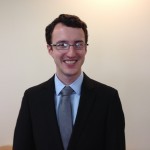The U.S. Copyright Office came to Stanford Law School yesterday to conduct a roundtable on Recordation Reengineering, The Stanford Law School Law and Policy Lab submitted comments and a thoughtful White Paper, and live tweeted the proceeding along with us (see @slspolicylab and @fairlyused). The Law and Policy Lab was represented at the roundtable by Peter Holm, third year law student. We interviewed Peter to get the essence of the issue and the White Paper, which is available as document 23 on the Copyright Office comments page.
The roundtable was conducted by Robert Brauneis, Abraham L. Kaminstein Scholar in Residence, U.S. Copyright Office.
The White Paper was submitted to Brauneis by Ariel Green, Sean Harb, Peter Holm, Kingdar Prussien, Kasonni Scales, and Juliana Yee, Copyright Policy Lab Practicum
Mary Minow: What was the impetus that led Stanford to research and write this White Paper?
Peter Holm: The Copyright Office contacted Stanford initially and Professor Paul Goldstein contacted us. I took a copyright class in the Fall of 2012 with Professor Goldstein. He emailed a few of us over the summer to see if we were interested. He described it as a chance to offer concrete suggestions to modernize the Copyright Office operations.
Minow: That sounds broad. When did the focus narrow to copyright document recordations?
Holm: That narrower focus developed in the Fall as we spoke with Maria Pallante, Register of Copyrights; Jacqueline Charlesworth, General Counsel, United States Copyright Office, and then with Professor Bob Brauneis who is there as a scholar in residence on these issues.
Minow: Why does this matter?
Holm: To have economic value, an owner of copyrighted works has to be able to sell and make his works available. If you don’t know who the owner is, you can’t make those transactions and the works lose value, so availability of this information is integral.
Minow: How do people find out now about who owns what copyrights?
Holm: It varies by industry. Neither registration of copyrights nor recordation of copyright transfers are required, but both have benefits to the owner. Because taking these steps is voluntary, the amount of information available for any given work varies considerably. So for example, in the music industry, there is extensive ownership information and licensing availability through ASCAP, BMI and the Harry Fox agency. So if I want to play Elton John at a party open to all Stanford students, I can get a license from those collecting societies and not worry about who owns the rights.
Whereas if I find a book in the library, published in 1955 and I want to use it, it’s harder to find information. There are probably records at the Copyright Office for the initial owner, as registration used to be required, but subsequent transfers might not have been recorded, so many questions remain. Did he transfer the copyright at some point? If not, is the author still alive? Did it go to his heirs, and who are they?
There is a substantial cost to investigating this, and often one doesn’t know who to talk to.
Minow: What’s the gist of your proposal?
Holm: It’s not a proposal per se. It’s really a list of options and tradeoffs. We look at the role of the copyright office. Should it hold a giant database, partner with third parties? Really it comes down to how do we best provide access to the public and get the information they need without overly burdening authors with unnecessary requirements? We don’t want to make it too hard for them to exercise their rights to transfer works, since transfers are potentially beneficial.
Minow: What are the benefits of recording transfer documents, since it’s not required?
Holm: It gives constructive notice of the transfer. Also, if you record a transfer document there is a presumption of validity for that document over subsequent instruments of transfer of the same title.
Minow: Thanks for talking with us today.
——
Peter Holm is a third year law student at Stanford Law School.
Mary Minow is the Executive Editor of the Stanford Copyright & Fair Use page.


